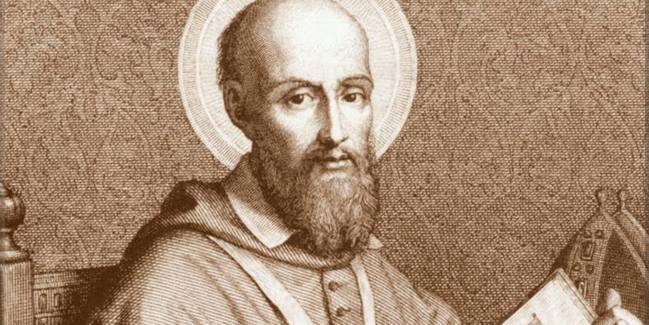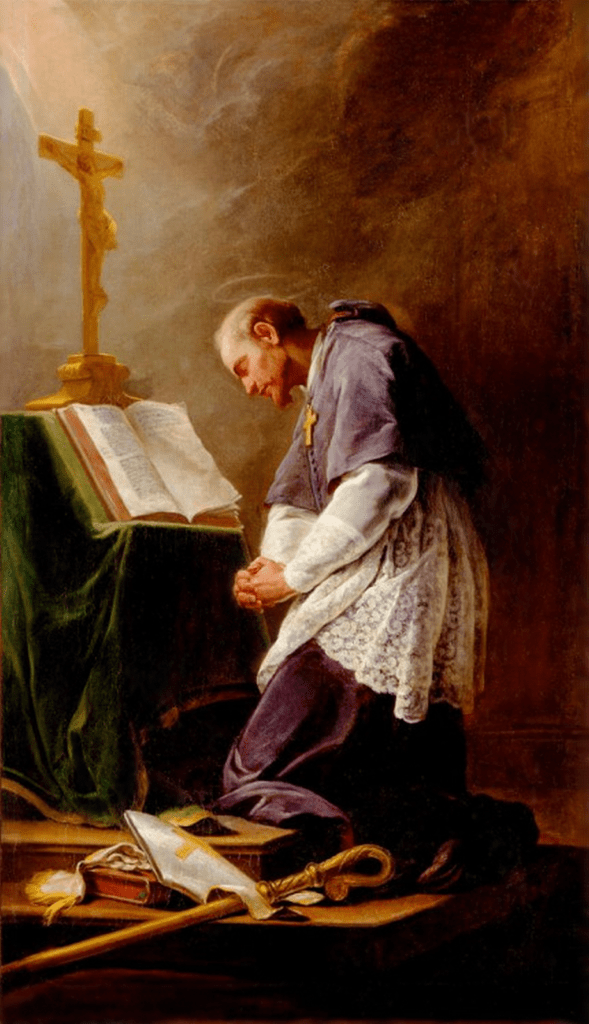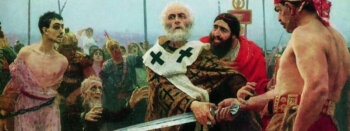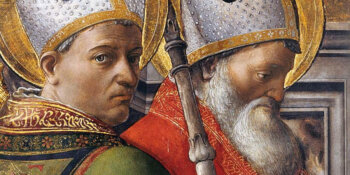
As a cradle Catholic, I always knew who “St. Francis” was: friend of animals, mendicant friar, stigmatist.
Oh. There’s another Francis—besides the one from Assisi?
Over time I came to learn about “the other St. Francis,” that is, St. Francis Xavier: great missionary to India and China.
And that’s not all.
Recently I’ve come to know someone who I once regrettably thought of as “the other other St. Francis.”
St. Francis de Sales.
And boy, had I been missing out.

Meeting the Saint
If you’re like me, you’ve only heard of St. Francis de Sales as the author of Introduction to the Devout Life.
It’s considered a classic of spirituality, and if I’d had any sense, I would have picked it up much sooner.
“The ‘Introduction,’ which is a masterpiece of psychology, practical morality, and common sense, was translated into nearly every language even in the lifetime of the author, and it has since gone through innumerable editions.”
Catholic Encyclopedia
It was through one of these “innumerable editions” that I first came to learn of St. Francis de Sales. My mother, Pat, was invited to write the forward for a new print of the Introduction, and she told me about it.
I remember her joking that she had to write the “introduction to the Introduction.” But more than that, I remember the obvious reverence she had for Francis’s work. She wrote:
I’m a professional fretter. But I’m in recovery, thanks to Saint Francis de Sales.
For more than twenty years, I’ve kept advice from one of his letters under a refrigerator magnet where I can see it every day. As if the letter he wrote once upon a time, a few centuries ago, were written just for me.
That’s how it is with good advice—holy counsel—because truth is timeless.
Pat Gohn, Introduction to the Introduction to the Devout Life
Intrigued by my mother’s words—and being a sucker for nice hardcovers—I couldn’t help but buy a copy and start reading.
In a short time, I found myself fostering a growing devotion to this great saint. So that you don’t end up like me—wishing you had known him sooner—I want to tell you all about him.
Wrestling with Despair
Francis de Sales was born in 1567, the eldest son into a noble family of Savoy in Italy. As a child of privilege, he was well-educated and well-connected. But status did not bring peace, and Francis lived in tumultuous, uncertain times.
The sixteenth century saw the shockwaves of the Protest Revolt and its disastrous consequences. The split within the Christian faith led to a sundering of society itself, with violence, hatred, and intolerance spreading across all of Europe.

Aside from the unrest within his homeland of Savoy, Francis himself began to suffer interiorly as a result of Protestant ideas. The Calvinist idea of predestination—whereby some souls are saved and others are damned regardless of our free will—caused despair within Francis’s heart. His certainty of his own damnation was so great that he became ill, taking to bed.
Hopelessness, despair, fear of the future…how many of us wrestle with these today? St. Francis shows us the way out: through Mary and Jesus.
One day, he prayed fervently before an image of Our Lady. Through her help, he became certain that God willed good for him—and for everyone, not just some elite group of pious individuals. In that moment, he consecrated himself to Our Lady’s service, and vowed to serve God the rest of his life.
He entered the priesthood with the reluctant support of his family. From then on, Francis worked tirelessly for God and His Church, writing, preaching, and performing acts of charity all for the sake of his Lord Jesus.
Meeting Conflict with Gentleness
Francis had a clear talent for writing and preaching (he’s the patron saint of writers) and God certainly put his talents to good use. As a priest he worked in the region of Geneva—the hotbed of Calvinist teaching.
The Calvinists sent preachers to argue against him, but found that he was too persuasive in his arguments for Catholicism. After that, they refused to let anyone speak or listen to Francis. So he wrote pamphlets instead, posting them in the streets and sliding them under doors.
Even when his life was in danger, he did not stop his work. In time, tens of thousands of people in the region returned to Catholicism through his words.
In 1602, Francis was consecrated Bishop of Geneva. Geneva was by then virulently anti-Catholic—but Francis set about his work with his usual industriousness.
He was relentless, but his every action was wrapped in kindness, gentleness, and humility. He gained a reputation as a spellbinding preacher and an approachable mentor. When some Catholic apologists were accusatory and even violent, Francis maintained that “he who preaches with love, preaches effectively.” His success proves the truth of these words.
Aside from his work as bishop, Francis labored as a writer, producing some of the best written defenses for the truths of the faith. More than just a catechist, Francis de Sales has proven to be an indispensable spiritual director—even for people like my mother and I, reading his words hundreds of years later.
The Introduction: Wise Counsel for Modern Times
The Introduction to the Devout Life is arguably his best collection of advice—though it’s far from the only option. In it, he shows that devotion to God helps every aspect of our lives: “[T]rue devotion,” he writes, “not only does not hinder any vocation or duty, but it adorns and beautifies it” (Introduction, Part I).
The Introduction fights against the same despair and lethargy that plagues our time, the same angst that Francis once felt.
All the excuses we tell ourselves—I’m too busy to pray, I have more important work to do, I’m just not like those “on-fire” Catholics, my sins are too great or too frequent—they all melt away under Francis’s gentle guidance and unyielding adherence to Christ’s Gospel.
The whole book is filled with practical advice on how to live out every day devoted to God. It’s not about spurning our existing activities and duties so that we can become pseudo-monks in our homes. Nor does Francis demand harsh penance and self-deprecation.
We should go about our lives with God, trusting in His tender care:
“Imitate little children who with one hand hold fast to their father while with the other they gather strawberries or blackberries from the hedges.”
Introduction to the Devout Life, Part III
St. Francis de Sales is a Doctor of the Church. His gentleness and focus on daily sanctification have also earned him the titles “Doctor of Charity” and “Doctor of the Laity.”
A Gentle Friend and Mentor

St. Francis de Sales comes off the page like a loving father giving you the advice you’ve always needed. He writes about finding and keeping true friendships, how to have true recreation and leisure, and how to live in a spirit of poverty despite worldly attachments.
He hits on some thorny spiritual topics too: rooting out grave sin, finding peace amid anxiety, spiritual dryness, and persevering through sadness or sorrow.
Saint Francis’s words have proven to be a source of true comfort for me in these troubling times, and his advice has acted like a compass pointing to our true home: heaven. Since I’ve started praying to him, I’ve felt his gentle guidance in my life, nudging me and encouraging me to pursue the work of God.
I hope that you, too, will look to Francis for help, and let his words of wisdom guide your life towards Christ.
St. Francis de Sales, pray for us!






